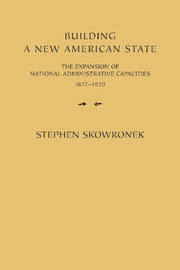Book contents
- Frontmatter
- Contents
- Preface
- Part I The state-building problem in American political development
- Part II State building as patchwork, 1877–1900
- Part III State building as reconstitution, 1900–1920
- Introduction: From patchwork to reconstitution
- 6 Reconstituting civil administration: economy, efficiency, and the repoliticization of American bureaucracy
- 7 Reconstituting the army: professionalism, nationalism, and the illusion of corporatism
- 8 Reconstituting business regulation: administrative justice, scientific management, and the triumph of the independent commission
- Epilogue: Beyond the state of courts and parties – American government in the twentieth century
- Notes
- Selected bibliography
- Index
8 - Reconstituting business regulation: administrative justice, scientific management, and the triumph of the independent commission
Published online by Cambridge University Press: 03 May 2010
- Frontmatter
- Contents
- Preface
- Part I The state-building problem in American political development
- Part II State building as patchwork, 1877–1900
- Part III State building as reconstitution, 1900–1920
- Introduction: From patchwork to reconstitution
- 6 Reconstituting civil administration: economy, efficiency, and the repoliticization of American bureaucracy
- 7 Reconstituting the army: professionalism, nationalism, and the illusion of corporatism
- 8 Reconstituting business regulation: administrative justice, scientific management, and the triumph of the independent commission
- Epilogue: Beyond the state of courts and parties – American government in the twentieth century
- Notes
- Selected bibliography
- Index
Summary
Although under the decision of the courts the National Government had power over the railways, I found, when I became President, that this power was either not exercised at all or exercised with utter inefficiency. The law against rebates was a dead letter… the scrupulous and decent railway men had been forced to violate it themselves under penalty of being beaten by their less scrupulous rivals. It was not the fault of these decent railway men. It was the fault of the Government.
Theodore Roosevelt, An Autobiography, 1913The Interstate Commerce Commission (ICC) emerged in 1920 as the signal triumph of the Progressive reconstitution. Here, the old mode of governmental operations was most completely superseded, and the reintegration of the American state with the new industrial society most clearly consummated. The agency gained powers hitherto dispersed among the states, Congress, the courts, and the executive. With these powers, it acquired the responsibility for supervising all aspects of the national railway system in accordance with the most advanced precepts of scientific management. The revival of the ICC was heralded as a vindication of the independent expert over the narrow interests of political managers and the usurpations of jealous judges. It became a symbol of a new democracy and a new political economy. It was all the promises of the new American state rolled into the expansion of national administrative capacities.
It was also a political response to a developmental dilemma. Beneath the rhetoric of reform lay the problems of reconstituting institutional power relationships and the implications of past failures.
- Type
- Chapter
- Information
- Building a New American StateThe Expansion of National Administrative Capacities, 1877–1920, pp. 248 - 284Publisher: Cambridge University PressPrint publication year: 1982



